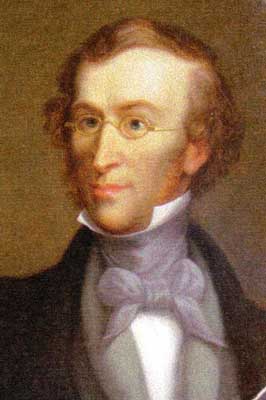John Dix Fisher
John Dix Fisher (1797–1850) was a prominent American physician and a pioneering advocate for the education and welfare of the blind. He is best known for his instrumental role in the founding of the Perkins School for the Blind, the first school for the blind in the United States. Fisher's dedication to improving the lives of visually impaired individuals marked a significant contribution to the field of special education and rehabilitation in the 19th century.
Early Life and Education[edit | edit source]
John Dix Fisher was born in 1797 in Wrentham, Massachusetts. He pursued his higher education at Brown University, where he graduated in 1816. Following his undergraduate studies, Fisher attended Harvard Medical School, earning his medical degree in 1825. His interest in the welfare of the blind was sparked during his travels in Europe, where he visited several institutions for the blind, notably the Institution Nationale des Jeunes Aveugles in Paris.
Career and Advocacy[edit | edit source]
Upon returning to the United States, Fisher became deeply involved in efforts to establish educational facilities for the blind. He was particularly moved by the lack of resources and institutions dedicated to the blind in his home country. Fisher's advocacy was instrumental in raising awareness and garnering support for the cause. In 1829, he convened a meeting of influential Bostonians to discuss the establishment of a school for the blind, which led to the founding of the New England Asylum for the Blind in 1832, later renamed the Perkins School for the Blind.
Fisher's vision extended beyond the mere establishment of the school. He was actively involved in its development, ensuring that it adopted the best practices observed in European institutions. Under his guidance, the school introduced innovative teaching methods and tools, including the early use of Braille. Fisher's commitment to the Perkins School for the Blind and its students helped to establish the institution as a model for similar schools across the country.
Legacy[edit | edit source]
John Dix Fisher's legacy is evident in the ongoing work of the Perkins School for the Blind, which continues to be a leading institution in the education and empowerment of visually impaired individuals. His pioneering efforts laid the groundwork for significant advancements in the field of special education and rehabilitation services for the blind. Fisher's work has inspired generations of educators, physicians, and advocates to continue the mission of improving the lives of the visually impaired.
Death[edit | edit source]
John Dix Fisher passed away in 1850. His contributions to medicine and the welfare of the blind remain a testament to his compassion and dedication to social reform.
Search WikiMD
Ad.Tired of being Overweight? Try W8MD's physician weight loss program.
Semaglutide (Ozempic / Wegovy and Tirzepatide (Mounjaro / Zepbound) available.
Advertise on WikiMD
|
WikiMD's Wellness Encyclopedia |
| Let Food Be Thy Medicine Medicine Thy Food - Hippocrates |
Translate this page: - East Asian
中文,
日本,
한국어,
South Asian
हिन्दी,
தமிழ்,
తెలుగు,
Urdu,
ಕನ್ನಡ,
Southeast Asian
Indonesian,
Vietnamese,
Thai,
မြန်မာဘာသာ,
বাংলা
European
español,
Deutsch,
français,
Greek,
português do Brasil,
polski,
română,
русский,
Nederlands,
norsk,
svenska,
suomi,
Italian
Middle Eastern & African
عربى,
Turkish,
Persian,
Hebrew,
Afrikaans,
isiZulu,
Kiswahili,
Other
Bulgarian,
Hungarian,
Czech,
Swedish,
മലയാളം,
मराठी,
ਪੰਜਾਬੀ,
ગુજરાતી,
Portuguese,
Ukrainian
Medical Disclaimer: WikiMD is not a substitute for professional medical advice. The information on WikiMD is provided as an information resource only, may be incorrect, outdated or misleading, and is not to be used or relied on for any diagnostic or treatment purposes. Please consult your health care provider before making any healthcare decisions or for guidance about a specific medical condition. WikiMD expressly disclaims responsibility, and shall have no liability, for any damages, loss, injury, or liability whatsoever suffered as a result of your reliance on the information contained in this site. By visiting this site you agree to the foregoing terms and conditions, which may from time to time be changed or supplemented by WikiMD. If you do not agree to the foregoing terms and conditions, you should not enter or use this site. See full disclaimer.
Credits:Most images are courtesy of Wikimedia commons, and templates Wikipedia, licensed under CC BY SA or similar.
Contributors: Prab R. Tumpati, MD

